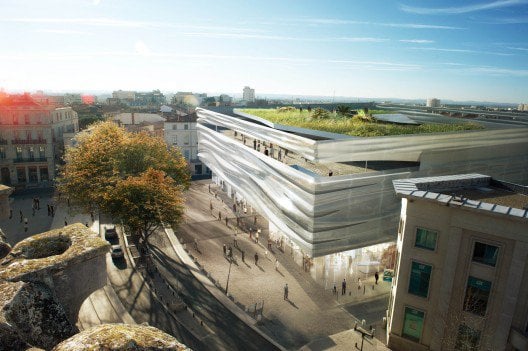
Photo: Courtesy of Elizabeth de Portzamparc.
Elizabeth de Portzamparc’s design for the Grand Equipment Documentary (GED). The project is expected to be completed in 2019.
Photo: AECDP
Architect Elizabeth de Portzamparc is becoming an increasingly popular urban planner and designer, having been selected to oversee the development of several major French building projects in the last couple of years. Most impressively, she got the commission as lead for Paris’s massive Grand Equipment Documentary (GED).
The Grand Equipment Documentary’s strikingly elegant and sleek glass design will be built on the Condorcet Campus of Aubervilliers, a commune of Paris. The building will act as a study center, with libraries focusing on the human and social sciences. Other planned amenities include a forum, cafe and bookstore, as well as public gardens on the roof. The project is expected to be completed in 2019.
De Portzamparc is married to fellow architect, and Prizker Prize winner Christian de Portzamparc, though she is a notable architect in her own right. She started her own agency in 1987 called AECDP, and has also worked in interior and furniture design. Her first major project was for the extension of Café de la Musique, at La Villette in 1984.
Along with her selection as the leading architect for the GED, she is developing several other French building projects.
The most important of her new commissions are the Musée de la Romanité and Le Bourget Railway Station. The museum is being built in the city of Nîmes with a completion date of 2017, and will focus on Roman history. The museum project competition attracted designs by such notable architects as Richard Meier and Rudy Ricciotti. It will be built across from the city’s Roman amphitheater, the Arena of Nîmes, and comes at a time of major development for several French museums (see Centre Pompidou To Open Design and Architecture Gallery and Louvre Gets Most Ambitious Facelift in 30 Years).
“The explicit requirement in this competition was to create a museum that would be a contemporary response to the Roman Arenas,” said de Portzamparc in a press release. “I took a long time to analyze the Arenas and asked myself about the notion of a contemporary building. It appeared clearly to me that the dialogue between these two architectures would be based on opposition, difference. On one side a round volume, encircled and bind by the verticality of the roman arcs, made of stone and deeply anchored into the ground, on the other side a great square volume, floating into space and entirely draped by a pleated glass robe.”
The railway station, which is expected to be finished in 2022, is being built in the Paris commune of le Bourget.
Rendering of de Portzamparc’s winning design for the Musée de la Romanité.
Photo: Courtesy of Elizabeth de Portzamparc